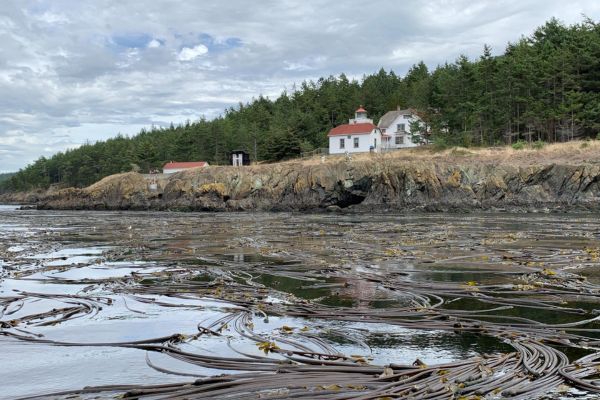
- Details
- By Ben Pryor
Tribal nations in the Pacific Northwest have experienced scorching heat waves this summer, breaking the norms of their historically temperate environment. Spring saw the region break long-standing records as May temperatures soared above the 90-degree Fahrenheit.
In July, Seattle broke records of six consecutive days with temperatures exceeding 90 degrees. At the same time, the heat in August was attributed to the death of three individuals in the region.
More broadly, July was Earth’s hottest month since U.S. temperature recordings began. These climate dynamics demand attention and underscore the urgency for comprehensive action in an increasingly unpredictable climate landscape.
At the forefront in the Pacific Northwest are the tribal nations situated along the waterways of Washington’s Puget Sound, facing the harsh realities of extreme weather events and their accompanying challenges. Among them is the Samish Indian Nation, located in the scenic San Juan Archipelago of Washington, nestled against the backdrop of the Cascade Range.
“The impacts are far-reaching and go unnoticed by the casual observer,” Samish Indian Nation Chairman Tom Wooten told Native News Online. “The people who have lived within our traditional territory, the Salish Sea, Indigenous and non-Indigenous alike, see the impacts and are taking positive action now.”
The Samish Department of Natural Resources focuses on preserving, protecting, and enhancing culturally significant natural resources and habitats within this area for current and future generations. Today, several species are struggling to survive and adapt.
“The elevated temperatures impact our health, as well as fresh and saltwater quality,” said Wooten. “The finfish and shellfish Samish citizens and our relations, the killer whale of the Salish Sea, relies on for our diets. These foods nourish our people’s bodies, spirits, and minds.”
The Realities Facing the Samish Indian Nation
Their history instructs proper relationship with the land, waters, and resources by teaching lessons left for them by ancestors about both the natural and spiritual worlds and how those worlds cannot be separated.
“The Samish Nation are a canoe people and have resided on the coasts of our island homes for time immemorial,” said Wooten. “Now our current, cultural, and historical sites are impacted by sea-level rise.”
The Pacific Northwest has experienced a significant decline in salmon harvest in recent years, which impacts the cultural heritage of regional tribes. Salmon are central to Washington tribes’ cultures, identities, and businesses.
The participation of non-tribal commercial fishers further exacerbates the reduction in salmon harvest. This decline becomes compounded by the fact that the aquatic ecosystem depends on a certain balance or harmony to succeed. The food chain erodes from the bottom as smaller parasites die or relocate to cooler waters.
In the Samish community, a common saying is, “When the tide goes out, our table is set for dinner.” The warming water temperatures threaten the health of all five species of Pacific Salmon, smelt, herring, steelhead trout, halibut, sucker, clams, oysters, and bull kelp.
The Strength of the Humble Bull Kelp
The Samish Nation is not sitting idly by. For generations, tribal members have been harnessing the power of bull kelp to address the ongoing impacts of climate change.
“The big thing for us in the near to medium term is to better understand the bull kelp, the overstory kelp, kelp species that are native to Samish traditional territory,” said Marcus Campidilli, a Climate Adaptation Specialist for the Samish Department of Natural Resources. “As we’re getting a better understanding of what is causing the decline of that species, how to best combat climate change by potentially out planting some of these bull kelp, and trying to rebuild some of these kelp forests that traditionally were very abundant and are a huge food source for Samish peoples.”
This unassuming marine plant can help remove carbon, actively absorbing and storing atmospheric carbon dioxide through photosynthesis. Through this, bull kelp acts as a natural carbon sink, reducing greenhouse gas concentrations and mitigating the impacts of global warming.
“Our concern is not singularly focused on any one potential stressor causing the decline of these kelp forests,” said Campidilli. “It is more kind of getting an understanding of which stressor is the big one or is it a multitude of stressors? From a climate change perspective, the big stressor is increased annual temperature because the kelp in this area has a specific temperature range – it needs colder water to really thrive.”
Given the global nature of climate change, the solutions are found in collective action and working together.
“As far as a solution, I don't think there is a one-size-fits-all sort of approach,” said Campidilli. “It’s not something where any one group, whether it’s one local municipality, or the state or, various NGOs (non-governmental organizations) or the tribes individually, are able to cause a broad change. I think that collective action piece is something that is kind of crucial to changing some of those policy issues.”
More Stories Like This
Gwich'in Tribal Governments Submit Comments Challenging Fish and Wildlife Service's Inadequate Environmental Review of Arctic Refuge Snow RoadRappahannock Tribe Challenges 9M-Gallon Water Plan
Feds release draft long-term plans for Colorado River management
Apache Leader Walks 60 Miles to Court Hearing That Will Decide Fate of Sacred Oak Flat
Rappahannock Tribe Raises Sovereignty and Environmental Concerns Over Caroline County Water Permit
Help us defend tribal sovereignty.
At Native News Online, our mission is rooted in telling the stories that strengthen sovereignty and uplift Indigenous voices — not just at year’s end, but every single day.
Because of your generosity last year, we were able to keep our reporters on the ground in tribal communities, at national gatherings and in the halls of Congress — covering the issues that matter most to Indian Country: sovereignty, culture, education, health and economic opportunity.
That support sustained us through a tough year in 2025. Now, as we look to the year ahead, we need your help right now to ensure warrior journalism remains strong — reporting that defends tribal sovereignty, amplifies Native truth, and holds power accountable.
 The stakes couldn't be higher. Your support keeps Native voices heard, Native stories told and Native sovereignty defended.
The stakes couldn't be higher. Your support keeps Native voices heard, Native stories told and Native sovereignty defended.
Stand with Warrior Journalism today.
Levi Rickert (Potawatomi), Editor & Publisher


